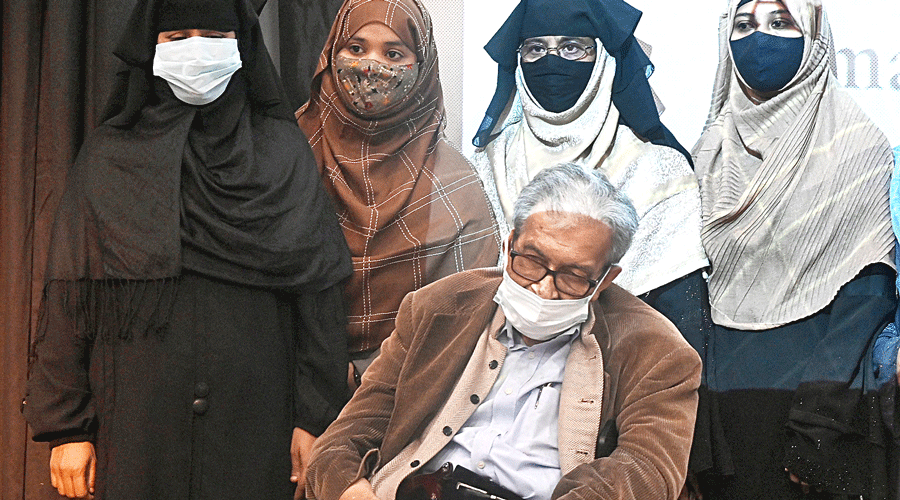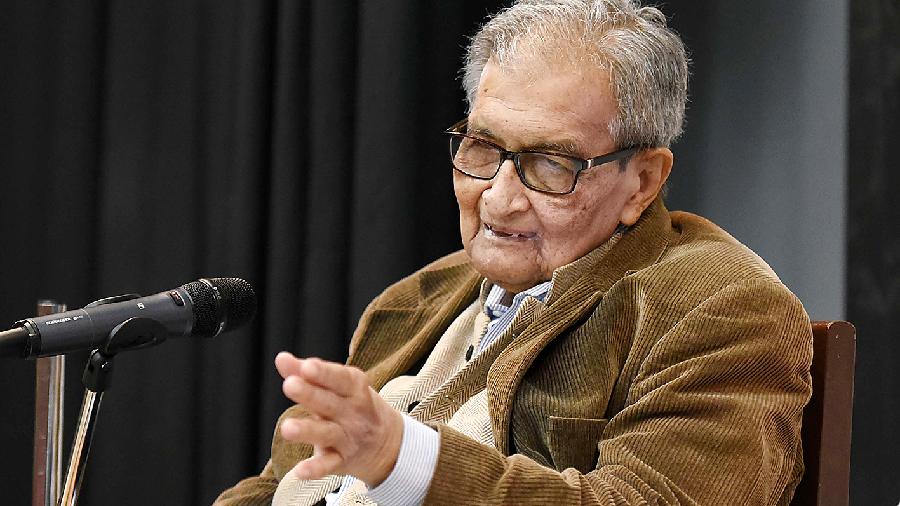A project that uses solar energy to power electrical appliances and improve other aspects of daily life in a rural pocket of Howrah district was endorsed by Nobel laureate Amartya Sen on Tuesday.
“I am 89. I don’t know how much more of this work will I be able to see. But I have an equal right to applaud the beginning of this initiative as you do,” Sen told the audience at a centre named after him in Salt Lake.
He was talking about a “pilot project to decentralise solar energy”, led by Pratichi Trust, set up with Sen’s Nobel Prize money.
Around two dozen young women and men in Howrah’s Domjur have been trained to use solar energy to power fans and lights and to cook food and clean water.
Some of the devices made by the trainees have been installed at the Munshidanga Purba Sardarpara ICDS Centre, around 16km from the heart of Kolkata.
The Howrah project was supported by the local administration. “This was a pilot project. Replication in other areas involves resources. We have received queries from some places about the model,” said a Pratichi Trust member.
The trainees have put together everyday electrical appliances like lights, fans, a Copenhagen solar cooker and a water filter. A couple of rooftop panels power the devices.
Sen praised the project before stressing the need to keep learning from others.
“Some other countries have natural sources of petrol and natural gas. India has a deficit there. But the amount of sunlight we get is abundant. Not many countries get it. What we have can be used to good effect.... There is no shame in learning from others, and then putting what we have learned to good use, and going on to create new knowledge,” Sen said at Amartya Sen Research Centre.
He cited the example of China which has made rapid progress in using solar power.
“China became aware of this challenge many years ago. That did not happen in India.... The progress of science and knowledge depends on the learning that one nation derives from another. The history of science has always been like this. If you think of mathematics... there is a lot of noise around Vedic mathematics. It is hard to believe anything like that existed. Maybe on a very small scale.
“The beginning of Indian mathematics was directly inspired by what we Indians were learning from work done in Babylon, Greece and Rome. Aryabhata, Bhrahmagupta and, subsequently, many others became experts in mathematics. Then came a time when Indian mathematics was taught in China and the Arab world. This scientific dynamism is much needed. We have learnt the most (in terms of solar power) from China. But what is happening in Japan, in South Korea? We need to keep track and look for possible cooperation,” said Sen.
The Chinese consul general in Kolkata, Zha Liyou, who was in the audience, said Sen had “many admirers” in China.
The installations at the ICDS centre were the culmination of regular training sessions held at the Deeniyat Muallima College in Howrah’s Santragachhi.
On Tuesday, at Amartya Sen Research Centre, the flagship institute of Pratichi Trust, the trainees and other people who made this project a success were felicitated.
“The purpose is to enable local youth to prepare, operate and maintain low-cost, solar devices in the Anganwadi centres and health centres in their area. The products assembled will be installed in public institutions that are primarily accessed by the underprivileged sections of society. Everything is being done keeping the pivotal role of the community in mind,” said Sabir Ahamed, research coordinator with Pratichi Trust.
Partha Sarathi Majumdar, a professor of physics at the Indian Association for the Cultivation of Science, trained the youth for months. On Tuesday, Majumdar said the project was “a fine example of yukta sadhana (working together)”, a theme that Sen has time and again harped on, most recently a couple of days ago at the same venue.
Yukta sadhana of Hindus and Muslims has led to spectacular Indian achievements in music, architecture, sculpture and several other areas, Sen had said.
Zinat Parvin, 19, was one of the trainees felicitated on Tuesday. A second-year student of geography honours in Azad Hind Fouz Smriti Mahavidyalaya in Domjur, Howrah, Zinat said the best part of the training was the installation.
“When something you have created comes to life in front of you, the joy cannot be described in words,” she said. Fahija Khatun, another trainee, is using the lessons to make a solar-powered fan at a primary school near her home.
Manira Parveen, a teacher at the ICDS centre where the appliances have been installed, said the additional fans would make the “gruelling summer somewhat bearable”.

